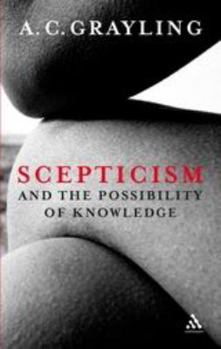Scepticism and the Possibility of Knowledge
Select Format
Select Condition 
Book Overview
Scepticism as a philosophical term is as old as the Greeks but has more recently been advanced by Montaigne, Descartes and Hume. To these, what little we know that seems certain is based on observation and habit as opposed to any logical or scientific necessity. Thus, sceptical views relate directly to epistemology-the theory of knowledge and what we can know-and, in the modern turbulent world, it is grayling's contention that these are issues that all contemporary people need to focus on. In seeking understanding of the human condition we need more than just a set of beliefs about it: all belief is irrational. We want to know or garner some kind of proof about the fundamental truths of human existence. This is the crux of the dilemma facing intelligent people today and is illuminated by this book.
Format:Paperback
Language:English
ISBN:1441154361
ISBN13:9781441154361
Release Date:January 2010
Publisher:Continuum
Length:224 Pages
Weight:0.65 lbs.
Dimensions:0.6" x 5.4" x 8.5"
Customer Reviews
2 ratings
A bit more academic than some of his other recent works...
Published by Thriftbooks.com User , 14 years ago
...but still accessible enough for a non-academic. Grayling is to philosophy popularizing what Richard Dawkins is to science popularizing, and his works--Scepticism included--have a breezy, conversational feel, even when addressing the most esoteric and sophisticated of topics. "Scepticism" takes on epistemology, the branch of philosophy concerned with the truth and how we identify it. With reviews of Wittgenstein, Russell, Quine, and Descartes (with forays into the ideas of supporters and detracters), Grayling presents a well-thought-out, balanced, and ultimately convincing case about what can be known and how. If you are mainly interested in reading Grayling and are not especially drawn to epistemology, I recommend his excellent and thoroughly popular book, The Choice of Hercules: Pleasure, Duty and the Good Life in the 21st Century. It is a more practical and entertaining book that draws from philosophy to make points about the well-lived life. "Scepticism," while an exemplar of its type, is a much more academic and theoretical work.
Extreme Skepticism
Published by Thriftbooks.com User , 15 years ago
No question about it, the philosophical method of positing extreme skepticism is often difficult for a credible social network. IF you can think outside the box you've been cornered into, Grayling should work to open new vistas. A. C. Grayling is a "professional philosopher," and those of us that enjoy all that professional philosophy bring us are easily happy with this and his other books. BUT, this book, like a series of publications storming the citadel, are not of the "professional" arcane nuanced kind. These short essays go directly to most of our practical concerns, without the arcane language of epistemology, axiology, praexeology, ontology, and more sophisticated subjects. BUT don't think this material "light weight." It's merely accessible, in ways that professionals get tongue-tied using the Greek fundamentals. Following the success of Robert Solomon's corpus, Grayling is more succinct, just as valuable, and even more accessible. Maybe, now, we can engage metaphysics of psychology, religion, superstition, voodoo, and chiropractic -- with the hard facts, the known classical values, and even upend the "traditional biblical moral values" and all the hypocrisy with humanistic values. If any two philosophers can, Solomon and Grayling are it.






